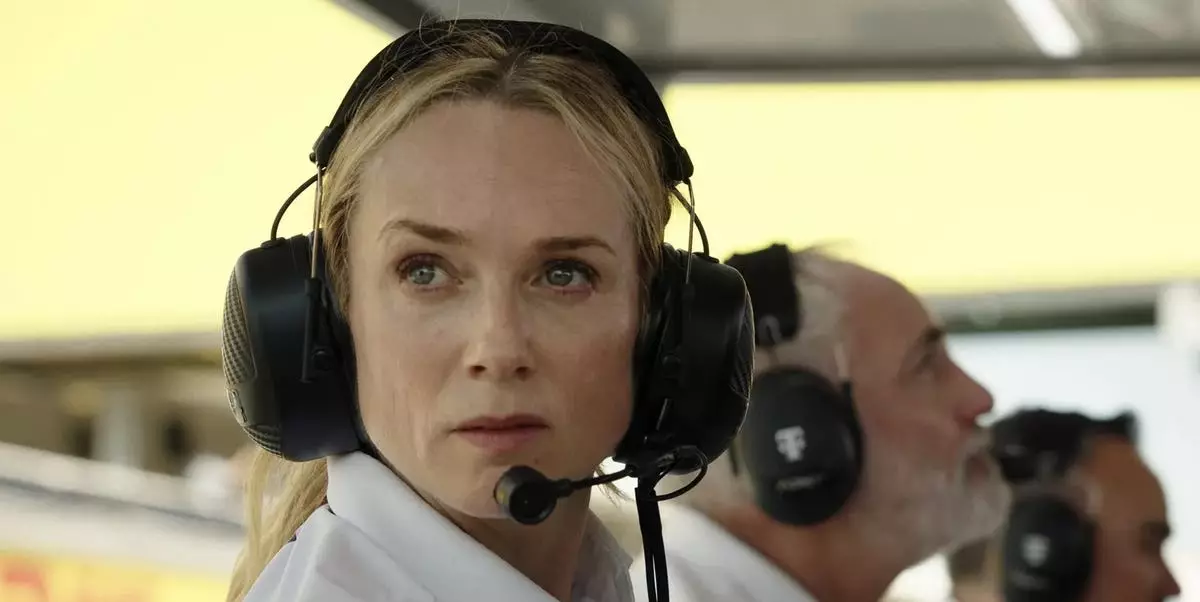In an industry often dominated by testosterone-fueled narratives and larger-than-life personalities, Kerry Condon’s portrayal of Kate McKenna in *F1* emerges as a breath of fresh air. While the film’s star power may be attracted to the likes of Brad Pitt or Damson Idris, it’s Condon’s character—a behind-the-scenes technical director—that holds the real emotional and intellectual core of the story. Her role challenges conventional stereotypes, humanizing the often-overlooked figures in sports engineering and management, insisting that leadership and influence are not solely reserved for those in the limelight.
Condon’s depiction of Kate McKenna symbolizes a modern shift in storytelling—a recognition that innovation, strategic thinking, and resilience come in many forms. Her character becomes an emblem for a new generation of professionals who, despite the gendered biases ingrained in motorsport’s history, are reshaping the narrative from within. This subtle yet powerful narrative shift fosters a deeper appreciation for the crucial roles that technical minds play in the roaring, adrenaline-fueled world of Formula 1.
Authenticity Rooted in Real-World Inspiration
What elevates Condon’s performance is her meticulous effort to base her character on real-life trailblazers, blending authenticity with creative storytelling. Her inspiration from figures like Bernie Collins, an Irish-born F1 analyst and former Head of Race Strategy at Aston Martin, underscores her commitment to portraying a layered, believable character. Collins herself epitomizes the unsung hero of motorsport—combining expert technical knowledge with a unique background that defies gender and cultural stereotypes.
Condon’s appreciation for Collins’s journey from Queen’s University Belfast to top-tier racing teams adds richness to her portrayal. She draws on her own Irish background and academic background in mechanical engineering, plunging herself into the technical depths with sincere curiosity. Her willingness to seek advice from actual industry insiders like Collins and Ruth Buscombe, a renowned motorsport engineer and F1 TV presenter, reveals a rare humility and dedication to portraying her character with nuance.
This approach also reflects a broader commentary on the importance of authentic representation. In an era where media narratives often simplify or sensationalize, Condon’s grounded approach pushes for a more accurate and respectful account of women’s contributions in technical roles. She refuses to romanticize these figures but instead offers a complex, inspiring vision of female leadership in a traditionally male-dominated arena.
Reimagining Leadership in Motorsport and Beyond
Kerry Condon’s portrayal transcends the screen, challenging audiences to reconsider notions of leadership, expertise, and influence. Kate McKenna is not just a background character; she embodies a new kind of heroism—one rooted in intelligence, resilience, and the quiet confidence of competence. Her character becomes a mirror reflecting the countless real-life women engineers, strategists, and technical directors steadily cracking the glass ceiling in motorsport.
This shift is not merely about representation; it’s about fundamentally redefining what it means to lead. It underscores that strategic brilliance, perseverance, and technical mastery are as vital, if not more so, than traditional notions of heroism rooted in physicality or charisma. In a landscape that constantly seeks innovation, the film’s emphasis on these behind-the-scenes figures aligns perfectly with the evolving industry itself.
Condon’s project—be it deliberate or accidental—serves as a vital reminder that stories in sports must evolve to include diverse voices and experiences. As she brings Kate McKenna to life, she advocates for a broader, more inclusive understanding of what it takes to succeed in high-stakes competitive environments. Ultimately, her depiction elevates the role of women in racing, encouraging current and future generations to view leadership through a broader, more inclusive lens, sparking change that reaches far beyond the racetrack.

